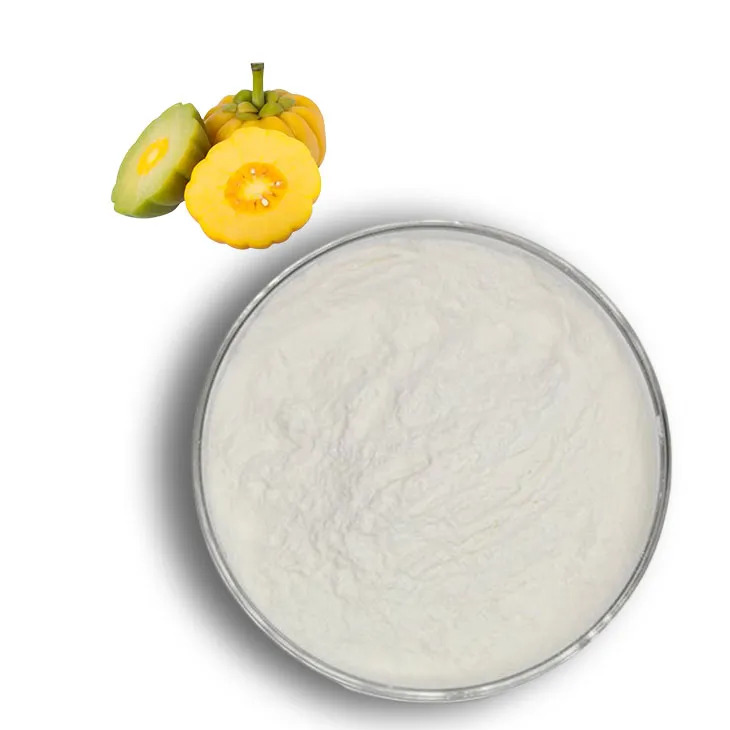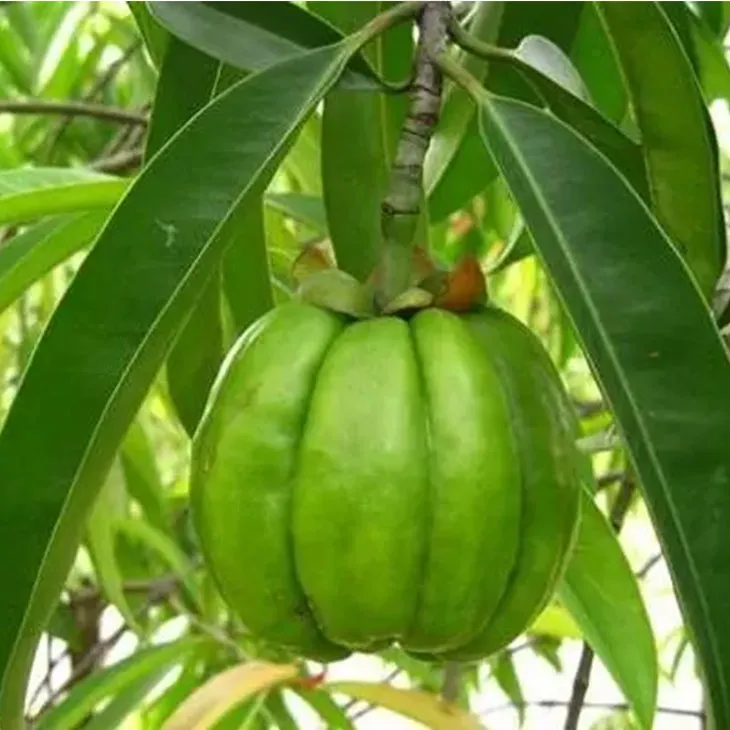- 0086-571-85302990
- sales@greenskybio.com
Does Garcinia cambogia extract have benefits for diabetes? Are these all safe and applicable for diabetic patients?
2024-11-11

1. Introduction
Diabetes has become a global health concern, affecting millions of people worldwide. As a result, there is an increasing interest in natural remedies that may help manage the condition. Garcinia Cambogia Extract has gained popularity in recent years, not only for its potential role in weight management but also for possible implications in diabetes. However, it is crucial to understand both its potential benefits and safety aspects, especially when considering its use by diabetic patients.

2. What is Garcinia Cambogia Extract?
Garcinia cambogia is a tropical fruit native to Southeast Asia and India. The extract is typically derived from the rind of the fruit. It contains hydroxycitric acid (HCA), which is thought to be the main active component responsible for its various proposed effects.
HCA has been studied for its potential influence on several physiological processes. For example, it is hypothesized to play a role in inhibiting an enzyme called citrate lyase, which is involved in the synthesis of fatty acids in the body. By interfering with this process, it may potentially affect energy metabolism and body weight regulation.

3. Potential Benefits for Diabetes
3.1. Blood Glucose Regulation
Some studies suggest that Garcinia Cambogia Extract may have a positive impact on blood glucose levels. One possible mechanism is through its effect on insulin sensitivity. Improved insulin sensitivity means that cells in the body can more effectively respond to insulin, allowing for better uptake of glucose from the bloodstream. This could potentially lead to more stable blood glucose levels in diabetic patients.
Additionally, the extract may also influence the liver's glucose production. The liver plays a crucial role in maintaining blood glucose homeostasis by either releasing or storing glucose. Garcinia cambogia extract might help regulate the liver's glucose - producing activities, preventing excessive glucose release into the bloodstream, especially during fasting or between meals.
3.2. Weight Management
Obesity is a significant risk factor for type 2 diabetes. Many diabetic patients struggle with excess weight, which can further exacerbate insulin resistance and blood glucose control problems. Garcinia cambogia extract has been widely promoted for its potential in weight loss.
As mentioned earlier, the HCA in the extract may affect fat metabolism. By potentially reducing fat synthesis and increasing fat oxidation, it could lead to a decrease in body fat percentage. Losing weight can have a positive impact on diabetes management, as it often improves insulin sensitivity and glycemic control.

4. Safety Considerations
4.1. Gastrointestinal Side Effects
One of the most common side effects associated with Garcinia cambogia extract is gastrointestinal discomfort. This can include symptoms such as nausea, vomiting, diarrhea, and abdominal pain. For diabetic patients, these side effects can be particularly concerning as they may interfere with the normal management of diabetes. For example, frequent diarrhea can lead to dehydration, which can affect blood glucose levels and electrolyte balance.
4.2. Drug Interactions
Diabetic patients often take multiple medications to manage their blood glucose levels, blood pressure, and other associated conditions. Garcinia cambogia extract may interact with some of these medications. For instance, it may interact with drugs that affect blood glucose, such as metformin or insulin. These interactions could potentially lead to either hypoglycemia (low blood glucose) or hyperglycemia (high blood glucose), depending on the nature of the interaction.
It is also important to note that the extract may interact with medications for other conditions that diabetic patients commonly have, such as heart medications or cholesterol - lowering drugs.
4.3. Lack of Standardization
The supplement industry for Garcinia cambogia extract is not highly regulated in some areas. This lack of standardization means that the quality and potency of different products can vary widely. Some products may contain contaminants or inaccurate amounts of HCA, which can pose risks to diabetic patients. For example, a product with a higher - than - expected amount of HCA may increase the likelihood of side effects.

5. Research Findings and Limitations
While there have been some studies suggesting potential benefits of Garcinia cambogia extract for diabetes, the overall research is still in its early stages. Many of the existing studies have been conducted on animals or in small - scale human trials.
Animal studies have shown some promising results in terms of blood glucose regulation and weight management. However, it is difficult to directly translate these findings to humans due to differences in physiology between species.
In human trials, the results have been somewhat inconsistent. Some studies have reported a positive effect on blood glucose levels or weight loss, while others have not found significant differences. These discrepancies may be due to factors such as differences in study design, the dosage of the extract used, and the characteristics of the study participants.
6. Recommendations for Diabetic Patients
Given the current state of knowledge, diabetic patients should approach the use of Garcinia cambogia extract with caution.
- Consult a healthcare provider: Before starting any new supplement, diabetic patients should consult their doctor or a registered dietitian. They can assess the individual's overall health status, current medications, and potential risks and benefits of using the extract.
- Be aware of product quality: If a healthcare provider approves the use of Garcinia cambogia extract, it is essential to choose a high - quality product from a reputable source. Look for products that have been tested for purity and potency.
- Monitor closely: Diabetic patients should closely monitor their blood glucose levels, as well as any potential side effects, while using the extract. If there are any significant changes in blood glucose or the occurrence of adverse effects, they should stop using the extract immediately and inform their healthcare provider.
7. Conclusion
Garcinia cambogia extract shows some potential benefits for diabetes, particularly in terms of blood glucose regulation and weight management. However, there are also significant safety concerns, including gastrointestinal side effects, drug interactions, and lack of standardization. More research is needed to fully understand its effects and safety in diabetic patients. Until then, diabetic patients should be cautious when considering the use of this extract and rely on the advice of healthcare professionals.
FAQ:
Q1: What is Garcinia cambogia extract?
Garcinia cambogia extract is derived from the fruit of the Garcinia cambogia tree. It contains hydroxycitric acid (HCA) which is believed to have various effects on the body, such as potential appetite suppression and influence on fat metabolism.
Q2: What are the potential benefits of Garcinia cambogia extract for diabetes?
Some studies suggest that Garcinia cambogia extract may help with diabetes in a few ways. It might assist in weight management as obesity is a risk factor for diabetes. By potentially suppressing appetite, it could lead to reduced calorie intake and subsequent weight loss. Additionally, it may have an impact on blood sugar levels, although the exact mechanisms are not fully understood yet.
Q3: Are there any safety concerns for diabetic patients using Garcinia cambogia extract?
Yes, there are safety concerns. Garcinia cambogia extract can interact with certain medications that diabetic patients may be taking, such as blood - thinning medications. It may also cause some side effects like digestive issues, including nausea, diarrhea, and abdominal discomfort. Moreover, its long - term safety, especially for diabetic patients, has not been comprehensively studied.
Q4: How should diabetic patients use Garcinia cambogia extract if they decide to try it?
If a diabetic patient decides to try Garcinia cambogia extract, they should first consult their doctor. The doctor can assess the patient's overall health, current medications, and individual risk factors. Dosage is also an important consideration, and it should be carefully determined based on the patient's specific situation.
Q5: Has Garcinia cambogia extract been proven effective for diabetes treatment?
As of now, it has not been definitively proven to be effective for diabetes treatment. While there are some promising findings in terms of its potential effects on weight and blood sugar, more research is needed. The current evidence is not sufficient to recommend it as a standard treatment for diabetes.
Related literature
- The Effects of Garcinia cambogia Extract on Metabolic Parameters in Diabetic Rats"
- "Garcinia cambogia and its Potential Role in Diabetes Management: A Review"
- "Safety and Efficacy of Garcinia cambogia in Diabetic Patients: Current State of Research"
- ▶ Hesperidin
- ▶ citrus bioflavonoids
- ▶ plant extract
- ▶ lycopene
- ▶ Diosmin
- ▶ Grape seed extract
- ▶ Sea buckthorn Juice Powder
- ▶ Beetroot powder
- ▶ Hops Extract
- ▶ Artichoke Extract
- ▶ Reishi mushroom extract
- ▶ Astaxanthin
- ▶ Green Tea Extract
- ▶ Curcumin Extract
- ▶ Horse Chestnut Extract
- ▶ Other Problems
- ▶ Boswellia Serrata Extract
- ▶ Resveratrol Extract
- ▶ Marigold Extract
- ▶ Grape Leaf Extract
- ▶ blog3
-
Cranberry Plants and Skin - care Products.
2024-11-11
-
Pomegranate Extract
2024-11-11
-
Citrus Aurantium Extract
2024-11-11
-
Citrus bioflavonoids
2024-11-11
-
Pine bark Extract Powder
2024-11-11
-
Oyster Mushroom Extract Powder
2024-11-11
-
Natural grape seed extract
2024-11-11
-
Maitake Mushroom Extract
2024-11-11
-
Saw Palmetto Extract
2024-11-11
-
Hesperidin
2024-11-11
-
Sophora Flavescens Root Extract
2024-11-11





















